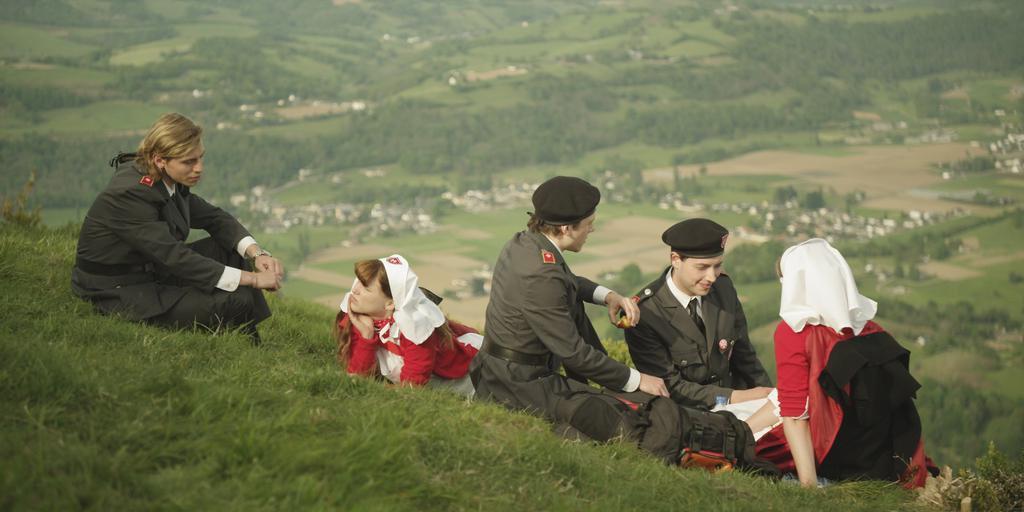
A Catholic pilgrimage underscored by a Lutheran chorale, a nun abandoning her duties to have an affair, a skeptic receiving a miraculous cure ahead of more devout pilgrims. A cliché I can’t stand says “God moves in mysterious ways,” and while it is possible to take that away from Jessica Hausner’s Lourdes, I think what’s more striking are the paradoxes within which grace can work.
For anyone who doesn’t know, the grotto in Lourdes, France is a very famous Catholic pilgrimage site where Mary appeared to Bernadette Soubirous when she was fourteen, revealing a hidden spring with healing powers. Once the vision was approved by the Church, it quickly became a popular pilgrimage site.
Christine (Sylvie Testud), the paraplegic skeptic, expresses disappointment in how touristy the grotto has become, but is still grateful for the chance to travel somewhere. Maria (Léa Seydoux), the young nun assigned to be her caretaker, is glad she is mostly enjoying it and dutifully stays by her side.
One of the best aspects of Lourdes is how much of it is left to the viewer’s interpretation. The film is in no way a sermon, and whether Christine receives a miraculous cure is debatable. Jessica Hausner sets the scenes and allows each viewer and character to conclude what they will. It’s not that different from the evidence for belief in God: we can look at events of the world and see them as proof of His existence or not. And because it’s so personal, those who choose one view will probably not persuade those who choose the other.
The opening shot of the movie is the nuns setting the course for dinner, underscored by Schubert’s Ave Maria. It’s an example of Hausner’s unobtrusive observation of literally setting a scene, but during that dinner we’re reminded that the pilgrimage is an opportunity offered to the pilgrims for the grace to change spiritually, even if they’re not healed physically.
The most notable thing about Mary’s appearance to Bernadette in 1858 is that she identified herself as the Immaculate Conception. In Catholic theology, this preservation from original sin made her the perfect vessel of grace to serve as a mediator between God and humankind by carrying the New Covenant (Jesus) in a virgin birth. That is an entire series of paradoxes, but they’re all ones which bring grace to a fallen world. In Lourdes, it is the seeming contradictions through which grace and change occur within the characters.
Perhaps the biggest paradox is that the skeptic Christine appears to receive a miraculous cure, or a nun having an affair provides an opportunity to witness that cure, or the tradition to award the “best pilgrim” is based on outward appearances. Obviously, none of those things can be known for certain, and it is in that uncertainty that grace can flourish and Hausner’s directing excels.
It is worth noting that Seydoux’s nun is named Maria, and her charge is named Christine (Christ + ine). The relationship between them may initially appear as a mother caring for a child, but once again a skeptical Christ figure who baffles and inspires others and a Marian figure who abandons her child during her transformation (or passion) are a series of paradoxes that make the grace being offered to the characters stand out all the more.
The prominent use of Bach’s Ich ruf zu dir, Herr Jesu Christ (I call on you, Lord Jesus Christ) as underscoring is remarkable, not only for it being a German Lutheran chorale used during a French Catholic Marian pilgrimage, but as a reminder that most of the pilgrims are calling on God for a cure to some ailment, which makes it all the more mysterious that the one who does not do so apparently receives it.
I said I dislike the phrase, “God moves in mysterious ways,” and that is because it is so often used to minimalize some tragedy or severe disappointment, as if to suggest that God willed evil. There is obviously some truth in the phrase, because as St. Augustine said, “If you can comprehend, it is not God.” That is the truth Lourdes hauntingly explores. As the final shot makes clear, we and the characters will not know precisely what happened to Christine, and each interpretation will only be influenced by the faith that one possesses.
— Evan Cogswell (2020), blogger at Catholic Cinephile
- Directed by: Jessica Hausner
- Produced by: Philippe Bober Philippe Bober Susanne Marian Antonin Svoboda Isabell Wiegand
- Written by: Géraldine Bajard Jessica Hausner
- Music by:
- Cinematography by: Martin Gschlacht
- Editing by: Karina Wessler
- Release Date: 2009
- Running Time: 96
- Language: French
Arts & Faith Lists:
2020 Top 100 — #57